Clinical & Commercial Drug Product Manufacturing: Outsourcing Advice from a CDMO

Taking a sterile drug product from clinical to commercial scale brings unique challenges. In this article, LLS Health investigates ways to mitigate scale-up challenges and achieve success.
The point in drug development where a project moves from the clinical to the commercial stage often brings unforeseen challenges that may cause delays in bringing a drug product to market. Chief among these is a lack of global capacity and infrastructure to successfully scale up sterile products to commercial levels.
Drug shortages, especially for sterile injectables, have been a pressing issue for several years.1 While pharmaceutical CDMOs have invested in additional manufacturing capacity, market estimates still predict that demand for aseptic manufacturing services will outpace supply in the next two years.2 In the rapidly expanding cell and gene therapy market, for example, manufacturing capacity shortfalls are estimated to be 5 times the current demand and will continue to grow in coming years. Drug developers report difficulty finding CDMOs with both clinical and commercial manufacturing expertise to help them get to market.3
In addition, events of the last 12 months have seen COVID-19 vaccines and treatments prioritized by larger pharma companies and their manufacturing partners. This has further reduced available production capacity to commercialize new therapies.
While around 80% of clinical trials were delayed or put on hold during 2020, many pharmaceutical executives estimate that clinical trial activity will return to pre-COVID levels in 2021.4,5 With all of this in mind, what can drug developers do to mitigate manufacturing capacity issues and ensure that their drug programs are given the priority they deserve?
Scale-Up Challenges for Sterile Drug Products
There are several reasons why manufacturing capacity is limited at the clinical-to-commercial stage.
Lack of Infrastructure and Expertise
Companies looking to commercialize a sterile drug product need access to manufacturing infrastructure and a team capable of scaling up from small clinical batches to commercial production. Meeting key deadlines and going to market depends heavily on this team’s ability to troubleshoot and adapt to processing challenges. However, many drug developers do not have this capability in-house.
Small start-up or virtual companies often rely on partners for their manufacturing needs. While they may find a contract development and manufacturing organization (CDMO) that can manufacture clinical trial material, transitioning to commercial scale can be challenging or impossible if the partner is not equipped for registration batches and beyond.
While transitioning to a separate CDMO for commercial production is possible, it can delay a project with additional qualification and training activities. Ideally, smaller companies can simplify the process by putting their lead candidate in the hands of a single partner that understands the needs of both clinical and commercial supply.
Larger companies, meanwhile, may not have the flexibility or available capacity to ramp up production for new drug products. Cleanroom space is often dedicated to existing, marketed products, and production lines may not be equipped for low-volume products, such as orphan drugs.
In cases like these, a CMO with flexible cleanroom space and the ability to work with a range of batch sizes plays a critical role in commercialization.
Supply Chain Obstacles
The prioritization of COVID-19 vaccines has further reduced manufacturing capacity at the clinical-to-commercial stage for new drug products. In addition to decreased capacity, the pandemic has also restricted the availability of supplies of vital components and resources, such as vials and other packaging, as well as intermediates and raw materials.
This is a universal issue across all of pharma, and it requires manufacturing organizations to maintain robust supply chains and plan ahead to mitigate risk.
Overcoming the Hurdles
Given these potential challenges, it is no surprise that drug developers – both large multinationals and smaller virtual businesses – may feel daunted by the prospect of bringing a treatment to market in the current climate.
In times like these, it’s more important than ever to partner with CDMOs that are transparent, attentive, and able to adapt to your project needs. These expert partners have the experience, resources, and capacity, as well as the reliable supply chain, to prioritize your project and bring it from clinical to commercial.
To find the right partner with the right capabilities for your needs, it’s important to ask them a few key questions:
- Do you have the availability and capacity to work on my project straight away?
- How have you secured your supply of raw materials against potential shortages?
- Will my project be a priority for your team?
- Do you have a minimum batch size?
- Does your site have the flexibility to increase production volumes as my project progresses?
Finding the Right Support
At the CDMO Division of LLS Health, we are proud of our ability to answer many of these questions in the affirmative.
We’ve equipped our FDA-ready facility with an attentive team and flexible capacity to support the transfer of your project from clinical to commercial. Our manufacturing facility has no minimum batch sizes, and whether you are developing large or small molecule product, we are here to help you bring your project to market as quickly as possible.
We have also taken steps to secure our procurement of raw materials and other vital components to safeguard against any shortages. As a member of the Berkshire Hathaway family of companies, we have access to a flexible and responsive global supply chain capable of mitigating the impact of supply shocks. You can also trust us as a long-term partner who will be here to meet your production needs for years to come.
Working with LLS Health, you can be confident that you have the support you need to hit your project milestones on time and deliver your product to market.
Benefit from our 20+ years of experience as a trusted partner to the pharma industry. To find out more about our commercial manufacturing services, visit our aseptic manufacturing page or contact our experts today.
References:
- Drug Shortages | The Pew Charitable Trusts. https://www.pewtrusts.org/en/research-and-analysis/reports/2017/01/drug-shortages
- Answering the CDMO shortage: A new paradigm for drug development – Drug Discovery and Development. https://www.drugdiscoverytrends.com/answering-the-cdmo-shortage-a-new-paradigm-for-drug-development/
- 17th Annual 2020 Top Bioprocessing TRENDS White Paper BioPlan 20200713B – BioPlan Associates. https://www.bioplanassociates.com/article/biopharma-manufacturing-trends-2020/17th-annual-2020-top-bioprocessing-trends-white-paper-bioplan-20200713b/
- van Dorn A. COVID-19 and readjusting clinical trials. Lancet (London, England). 2020;396(10250):523-524. doi:10.1016/S0140-6736(20)31787-6
- Q3 2020 Pharma Services Sector Snapshot – Bourne Partners. https://bourne-partners.com/sector-report/q3-2020-pharma-services-sector-snapshot/

Related News
-
Sponsored Content CPHI Online Trend Report: How can flow chemistry help businesses achieve their sustainability goals?
In our latest CPHI Online Trend Report, we partner with Asymchem to understand the innovative potential of flow chemistry for API manufacturing, especially in regards to meeting sustainability goals. -
Sponsored Content Ashwagandha and Herbal Medicines: Pharma’s Next Opportunity
Herbal medicines and nutraceuticals have seen a surge in interest since the onset of the COVID-19 pandemic. Driven by patient interest in prioritising personalised and integrative medicines, the herbal ingredients industry is now faced with concerns pe... -
Sponsored Content Discover Our Organic Mineral Salts as APIs
Discover the range of organic mineral salts that serve as Active Pharmaceutical Ingredients available from Dr. Paul Lohmann®. -
Sponsored Content CPHI Podcast Series: Ursatec – celebrating 30 years of pioneering preservative free
In the latest episode of the CPHI Podcast Series, Digital Editor Lucy Chard spoke with Dominik Rocchi of Ursatec. -
Sponsored Content How healthcare trends inform dosage forms
Capsules encompass one of the most popular solid oral dosage forms for pharmaceutical products, with the global empty capsule market predicted to rise to USD $3.7 billion by 2026. The growth in the capsule market can be partly attributed to the many op... -
Sponsored Content Pharma Trend Outlook: Pharma 4.0 and Industry Resilience
Download our 2023 Pharma Trends Outlook report to discover the trends set to shape the pharmaceutical landscape in the new year, with expert opinions and insight from across the pharmaceutical value chain. -
Sponsored Content CPHI Podcast Series: Key Considerations in Selecting the Right CMO Partner
In this month's episode we hear from Jayna Blake, Senior Project Manager for Technical Programs at Baxter BioPharma Solutions, on key considerations for successful CMO selection. -
Sponsored Content Size doesn’t matter: How smaller deals are shaping healthcare M&A
Several mega-deals have made a splash in the pharma and life sciences industries over recent years – from AstraZeneca’s acquisition of Alexion for $39 billion to Gilead Sciences’ $21 billion purchase of Immunomedics. With am...
Position your company at the heart of the global Pharma industry with a CPHI Online membership
-
Your products and solutions visible to thousands of visitors within the largest Pharma marketplace
-
Generate high-quality, engaged leads for your business, all year round
-
Promote your business as the industry’s thought-leader by hosting your reports, brochures and videos within your profile
-
Your company’s profile boosted at all participating CPHI events
-
An easy-to-use platform with a detailed dashboard showing your leads and performance

.png)





